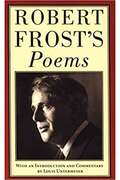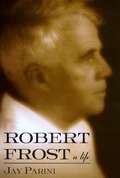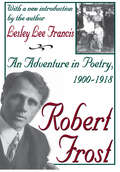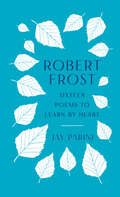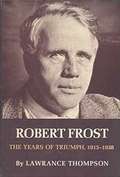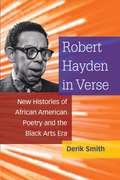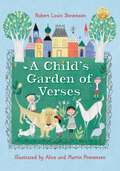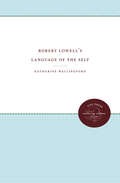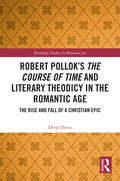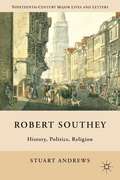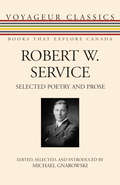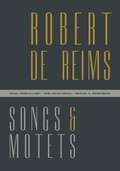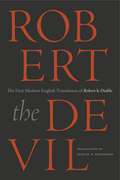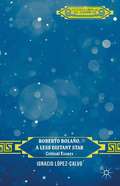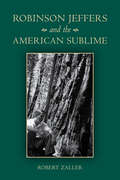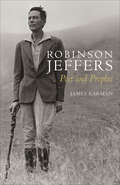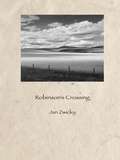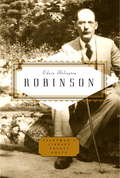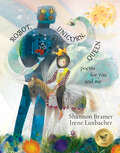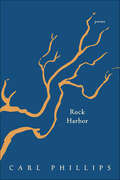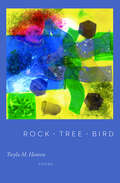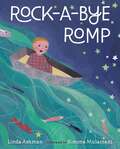- Table View
- List View
Robert Frost in Context
by Mark RichardsonThis new critical volume offers a fresh, multifaceted assessment of Robert Frost's life and works. Nearly every aspect of the poet's career is treated: his interest in poetics and style; his role as a public figure; his deep fascination with science, psychology, and education; his peculiar and difficult relation to religion; his investments, as thinker and writer, in politics and war; the way he dealt with problems of mental illness that beset his sister and two of his children; and, finally, the complex geo-political contexts that inform some of his best poetry. Contributors include a number of influential scholars of Frost, but also such distinguished poets as Paul Muldoon, Dana Gioia, Mark Scott, and Jay Parini. Essays eschew jargon and employ highly readable prose, offering scholars, students, and general readers of Frost a broadly accessible reference and guide.
Robert Frost's Poems
by Robert Frost Louis UntermeyerA collection of Robert Frost's poems with background information by Louis Untermeyer
Robert Frost's Poems
by Robert Frost Louis UntermeyerA proven bestseller time and time again, Robert Frost's Poems contains all of Robert Frost's best-known poems-and dozens more-in a portable anthology. Here are "Birches," "Mending Wall," "Stopping by Woods on a Snowy Evening," "Two Tramps at Mudtime," "Choose Something Like a Star," and "The Gift Outright," which Frost read at the inauguration of John F. Kennedy." An essential addition to every home library, Robert Frost's Poems is a celebration of the New England countryside, Frost's appreciation of common folk, and his wonderful understanding of the human condition. These classic verses touch our hearts and leave behind a lasting impression.
Robert Frost: A Life
by Jay Parini"I have tried to understand how Frost got from day to day and from poem to poem, tracing his rich, always developing, intellectual and artistic life over many decades. My intention was not to supplant or overtake previous biographers and critics but merely to add a significant layer. I can say without fear of exaggeration that this life of Frost was a labor of love. It is one of the few books I have ever finished with deep reluctance."
Robert Frost: An Adventure in Poetry, 1900-1918
by Lesley Lee FrancisIn this volume, Lesley Lee Francis, granddaughter of Robert Frost, brings to life the Frost family's idyllic early years. Through their own words, we enter the daily lives of Robert, known as RF to his family and friends, his wife, Elinor, and their four children, Lesley, Carol, Irma, and Marjorie. The result is a meticulously researched and beautifully written evocation of a fleeting chapter in the life of a literary family.Taught at home by their father and mother, the Frost children received a remarkable education. Reared on poetry, nurtured on the world of the imagination, and instructed in the art of direct observation, the children produced an exceptional body of writing and artwork in the years between 1905 and 1915. Drawing upon previously unexamined journals, notebooks, letters, and the little magazine entitled The Bouquet produced by the Frost children and their friends, Francis shows how the genius of Frost was enriched by his interactions with his children. Francis depicts her grandfather as a generous, devoted, and playful man with a striking ability to communicate with his children and grandchildren. She traces the family's adventures from their farm years in New Hampshire through their nearly three years in England. This enchanting evocation of the Frost family's life together makes more poignant the unforeseen personal tragedies that would befall its members in later years.
Robert Frost: Sixteen Poems to Learn by Heart
by Robert Frost Jay PariniCelebrate Robert Frost's 150th birthday with a deluxe keepsake edition featuring 16 of his greatest poems—with brilliant essays highlighting his special genius and the power of memorization to unlock the magic of his languageDuring a public reading Robert Frost was once asked why he so frequently recited his poems from memory. With typical wit, he replied: &“If they won&’t stick to me, I won&’t stick to them.&” Remarkably among the modern poets, his poems &“stick&” to the reader: "Mending Wall," with its famous invocation of the rural maxim "Good fences make good neighbors""The Road Not Taken," about the beguiling possibilities of life"Birches," which reminds us that "One could do worse than be a swinger of birches"Stopping by Woods on a Snowy Evening," with its unforgettable final line: "And miles to go before I sleep."Here, poet and Frost biographer Jay Parini presents these and 12 other Frost poems to learn by heart. In short accompanying commentaries, Parini illuminates the stylistic and imaginative features of each of the poems, drawing in biographical material from Frost&’s life to provide further context. &“The goal of this little book is to encourage readers to slow down—to listen to Frost&’s words and phrases, to locate their deepest rhythms, and hear the tune of each poem as it unfolds. . . . Memorizing a poem can teach us much about a poem&’s structure and argument, and about the resonance of particular words. And best of all, memorization makes a poem part of our inner lives. Once committed to memory, a poem is available to us for recall at any time—and the occasions for remembering it will make themselves known to us. It isn&’t something we have to work at.&” Anyone who has read and loved Frost&’s poetry will want to own and treasure this little gift edition. Those reading Frost for the first time or those wishing to become better acquainted with one of America&’s greatest poets will not find a better, more insightful guide than Jay Parini.
Robert Frost: The Years of Triumph 1915-1938
by Lawrance ThompsonRobert Frost: The Years of Triumph, 1915-1938. Volume two of Thompson's Frost biography receives a Pulitzer Prize despite the controversy raised by Thompson's less-than-sympathetic portrait of this American literary giant.
Robert Hayden in Verse: New Histories of African American Poetry and the Black Arts Era
by Derik SmithThis book sheds new light on the work of Robert Hayden (1913–80) in response to changing literary scholarship. While Hayden’s poetry often reflected aspects of the African American experience, he resisted attempts to categorize his poetry in racial terms. This fresh appreciation of Hayden’s work recontextualizes his achievements against the backdrop of the Black Arts Movement and traces his influence on contemporary African American poets. Placing Hayden at the heart of a history of African American poetry and culture spanning the Harlem Renaissance to the Hip-Hop era, the book explains why Hayden is now a canonical figure in 20th-century American literature. In deep readings that focus on Hayden’s religiousness, class consciousness, and historical vision, author Derik Smith inverts earlier scholarly accounts that figure Hayden as an outsider at odds with the militancy of the Black Arts movement. Robert Hayden in Verse offers detailed descriptions of the poet’s vigorous contributions to 1960s discourse about art, modernity, and blackness to show that the poet was, in fact, an earnest participant in Black Arts-era political and aesthetic debates.
Robert Louis Stevenson's A Child's Garden of Verses
by Robert Louis StevensonHow do you like to go up in a swing, Up in the air so blue? Oh, I do think it the pleasantest thing Ever a child can do! Robert Louis Stevenson&’s rhymes have charmed children and adults alike since 1885, when they first appeared to a delighted public. Stevenson&’s joyful exploration of the world speaks directly from a child&’s point of view and celebrates the child&’s imagination. This Golden Books edition, originally published in 1951, features lively, colorful illustrations by Caldecott Medalists Alice and Martin Provensen. The original artwork has been digitally restored for this edition—resulting in a stunning, best-ever reproduction!
Robert Lowell's Language of the Self
by Katharine WallingfordKatharine Wallingford's incisive study treats Robert Lowell's work as a poetry of self-examination and explores the ways in which he used methods common to psychoanalysis and other forms of psychotherapy in his poetry. Although he was never psychoanalyzed in a strictly Freudian sense, Lowell spent many years in psychotherapy. Wallingford stresses not the pathological aspects of Lowell's work, however, but rather his lifelong process of self-examination, a process with ethical as well as psychological dimensions. She links this process to the tradition of self-scrutiny that Lowell inherited from his New England Puritan ancestors.Through close readings of the poetry and of unpublished drafts of several poems as well as letters from Lowell to George Santayana, Allen Tate, and his cousin Harriet Winslow, Wallingford treats Lowell's use of specific psychoanalytic techniques: free association, repetition, concentration on the relation between the poet and the "other" to whom he addresses himself, and the use of memory to probe the past. The book considers as well the role the narrative plays in these psychoanalytic and poetic techniques.Lowell believed firmly in the identity of self and language -- "one life, one writing" -- and this study brings us closer to an understanding both of the poet and of his dense and moving poetry. It enriches our reading of Lowell's poetry by calling attention to the ways in which his poetic techniques are analogous to and to some extent derived from psychoanalytic techniques -- techniques that have in our time become integrated into our culture as a whole.Originally published in 1988.A UNC Press Enduring Edition -- UNC Press Enduring Editions use the latest in digital technology to make available again books from our distinguished backlist that were previously out of print. These editions are published unaltered from the original, and are presented in affordable paperback formats, bringing readers both historical and cultural value.
Robert Pollok’s The Course of Time and Literary Theodicy in the Romantic Age: The Rise and Fall of a Christian Epic (Routledge Studies in Romanticism)
by Deryl DavisThis book explores the contexts and reception history of Robert Pollok’s religious epic The Course of Time (1827), one of the best- selling long poems of the nineteenth century, which has been almost entirely forgotten today. Widely read in the United States and across the British Empire, the poem’s combination of evangelical Calvinism, High Romanticism, and native Scottishness proved irresistible to many readers. This monograph traces the poem’s origins as a defense of Biblical authority, divine providence, and religious orthodoxy (against figures like Byron and Joseph Priestley) and explores the reasons for The Course of Time’s enormous, decades- long popularity and later precipitous decline. A close reading of the poem and an examination of its reception history offers readers important insights into the dynamic relationship between religion and wider culture in the nineteenth century, the uses of literature as a vehicle for theological argument and theodicy, and the important but often overlooked role that religion played in literary— and, particularly, Scottish— Romanticism. This work will appeal to scholars of religious history, literary history, Evangelicalism, Romanticism, Scottish literature, and nineteenth- century culture.
Robert Southey
by Stuart AndrewsIn"Robert Southey," Andrews""argues that Robert Southey'sdenunciation of global Catholicism is essential to understanding his life, works, and times. On this issue, Southey was absolutely consistent - from his first visit to Lisbon in 1795-6 to his "Colloquies" published in 1829. The Poet Laureate's partisan rhetoric reflect its intensity and reveal a great deal about the religious culture of this stormy period in England. "
Robert W. Service: Selected Poetry and Prose
by Robert W. Service Michael GnarowskiThe writing of Robert W. Service is mostly known through his poems and ballads. Immortalized by his two iconic ballads, "The Cremation of Sam McGee" and "The Shooting of Dan McGrew," he has entered the world’s imagination as the Bard of the Yukon. But Service was much more than a chronicler of the Great North.A traveller and adventurer who tried his hand at many occupations, Service left a fascinating set of impressions: the successful literary life in the course of which he produced everything from poems and ballads to fictional romance to thrillers and how to stave off the dreary process of aging.Robert W. Service is a fresh selection of the most interesting and significant works of the author with a biographical introduction and a select bibliography of additional readings.
Robert de Reims: Songs and Motets
by Robert de ReimsRobert de Reims, also known as "La Chievre de Rains," was among the earliest trouvères—poet-composers who were contemporaries of the troubadours but who wrote in the dialects of northern France. This critical edition provides new translations into English and modern French of all the songs and motets ascribed to him, along with the original texts, the extant music, and a substantive introduction.Active sometime between 1190 and 1220, Robert was an influential figure in the literary circles of Arras. Thirteen compositions set to music are here attributed to him, including nine chansons and four polyphonic motets that were broadly disseminated in the thirteenth century and beyond. Robert’s work is exceptional on a number of fronts. He lavished particular care on the phonic harmony of his words. Acoustic luxuriance and expertise in rhyming, grounded in the play of echoes and variation (often extending into the music), constitute the hallmark of his poetry. Moreover, he is the earliest trouvère known to have composed a parodic sotte chanson contre Amours (silly song against Love).Located clearly at the nexus of monophonic song and polyphony, Robert’s corpus also poses the intriguing question of trouvère participation in the development of the polyphonic repertory. The case of Robert de Reims jostles and tempers the standard history of the chanson and motet.Accessible and instructive, this trilingual critical edition of his complete works makes the oeuvre of this innovative and consequential trouvère available in one volume for the first time.
Robert de Reims: Songs and Motets
by Robert de ReimsRobert de Reims, also known as “La Chievre de Rains,” was among the earliest trouvères—poet-composers who were contemporaries of the troubadours but who wrote in the dialects of northern France. This critical edition provides new translations into English and modern French of all the songs and motets ascribed to him, along with the original texts, the extant music, and a substantive introduction.Active sometime between 1190 and 1220, Robert was an influential figure in the literary circles of Arras. Thirteen compositions set to music are here attributed to him, including nine chansons and four polyphonic motets that were broadly disseminated in the thirteenth century and beyond. Robert’s work is exceptional on a number of fronts. He lavished particular care on the phonic harmony of his words. Acoustic luxuriance and expertise in rhyming, grounded in the play of echoes and variation (often extending into the music), constitute the hallmark of his poetry. Moreover, he is the earliest trouvère known to have composed a parodic sotte chanson contre Amours (silly song against Love).Located clearly at the nexus of monophonic song and polyphony, Robert’s corpus also poses the intriguing question of trouvère participation in the development of the polyphonic repertory. The case of Robert de Reims jostles and tempers the standard history of the chanson and motet.Accessible and instructive, this trilingual critical edition of his complete works makes the oeuvre of this innovative and consequential trouvère available in one volume for the first time.
Robert the Devil: The First Modern English Translation of Robert le Diable, an Anonymous French Romance of the Thirteenth Century
by Samuel N. RosenbergSamuel N. Rosenberg, one of the premier translators of Old French, presents in this volume the first modern English-language version of the thirteenth-century French romance Robert le Diable, a tale of supernatural birth and spiritual redemption. Robert is born after his mother, a childless noblewoman, secretly calls upon Satan to help her conceive. His wicked behavior as a boy and, later, as a destructive young man is so brutal that one day Robert prevails upon his mother to reveal the secret of his birth and thus the source of his wickedness. Upon learning the truth, he leaves his privileged home in Normandy to seek salvation. Robert’s lengthy penance—under the aegis of the Pope and a pious hermit—begins with his acting as a mute fool in the Roman Emperor’s court and ends with his sainthood. In between he plays the hero’s role in defeating the Turks in battle and turns down the hand of the Emperor’s daughter in marriage, choosing instead to return to the hermit’s abode. The legend of Robert le Diable was extraordinarily influential in the seven hundred years after its creation, generating new versions and adaptations in various languages, ranging from sixteenth-century English adaptations by Wynken de Worde and Thomas Lodge to Giacomo Meyerbeer’s esteemed 1831 opera. Framed by a thoughtful introduction and thorough bibliography, this accessible translation renders the original octosyllabic rhymed couplets of the metrical Old French romance in energetic free verse.
Roberto Bolaño, a Less Distant Star: Critical Essays (Literatures of the Americas)
by Ignacio López-CalvoRoberto Bolaño has attained an almost mythical stature and is often considered the most influential Latin American writer of his generation. The first English-language volume of essays on the Chilean author, Roberto Bolaño, a Less Distant Star: Critical Essays, includes ten critical essays of his oeuvre. With a special emphasis on his masterpieces: 2666, The Savage Detectives, By Night in Chile, and Distant Star, the essays address topics such as Borges's influence and the role of repetition, social memory, allegory, and neoliberalism.
Robinson Jeffers and the American Sublime
by Robert ZallerRobinson Jeffers and the American Sublimeis the most comprehensive and most substantial critical work ever devoted to the major American poet Robinson Jeffers (1887-1962). Jeffers, the best known poet of California and the American West, particularly valorized the Big Sur region, making it his own as Frost did New England and Faulkner, Mississippi, and connecting it to the wider tradition of the American sublime in Emerson, Thoreau, and John Muir. The book also links Jeffers to a Puritan sublime in early American verse and explores his response to the Darwinian and Freudian revolutions and his engagement with modern astronomy. This discussion leads to a broad consideration of Jeffers' focus on the figure of Christ as emblematic of the human aspiration toward God-a God whom Jeffers defines not in Christian terms but in those of an older materialist pantheism and of modern science. The later sections of the book develop a conspectus of the democratic sublime that addresses American exceptionalism through the prism of Jeffers' Jeffersonian ethos. A final chapter places Jeffers' poetic thought in the larger cosmological perspective he sought in his late works.
Robinson Jeffers: Poet and Prophet
by James KarmanThe precipitous cliffs, rolling headlands, and rocky inlets of the California coast come alive in the poetry of John Robinson Jeffers, an icon of the environmental movement. In this concise and accessible biography, Jeffers scholar James Karman reveals deep insights into this passionate and complex figure and establishes Jeffers as a leading American poet of prophetic vision. In a move that would define his life's work, Jeffers' family relocated to California from Pennsylvania in 1903 when he was sixteen. While a graduate student at the University of Southern California he met Una Call Kuster, a student who was the wife of a prominent Los Angeles attorney, and they began a scandalous affair that made the front page of the Los Angeles Times. They eventually married and escaped to Carmel, California to write poetry; there they would spend the rest of their lives. At the height of his popularity in the 1920s and 1930s, Jeffers became one of the few poets ever featured on the cover of Time magazine, and posthumously put on a U.S. postage stamp. Writing by kerosene lamp in a granite tower that he had built himself, his vivid and descriptive poetry of the coast evoked the difficulty and beauty of the wild and inspired photographers such as Edward Weston and Ansel Adams. He was known for long narrative blank verse that shook up the national literary scene, but in the 1940s his interest in the Greek classics led to several adaptations which were staged on Broadway to great success. Inspiring later artists from Charles Bukowski to Czeslaw Milosz and even the Beach Boys, Robinson Jeffers' contribution to American letters is skillfully brought back out of the shadows of history in this compelling biography of a complex man of poetic genius who wrote so powerfully of the astonishing beauty of nature.
Robinson's Crossing
by Jan ZwickyThe poems in this book arise from Robinson’s Crossing — the place where the railway ends and European settlers arriving in northern Alberta had to cross the Pembina River and advance by wagon or on foot. How have we crossed into this country, with what violence and what blind love? Robinson’s Crossing enacts the pause at the frontier, where we reflect on the realities of colonial experience, but also on the nature of living here — on historical dwelling itself. In long meditative narratives and shorter probing lyrics, Jan Zwicky shows us-as she has in her celebrated Lyric Philosophy and the Governor General’s award-winning Songs for Relinquishing the Earth — how music means and meaning is musical.
Robinson: Poems
by Edwin Arlington Robinson Scott DonaldsonEdwin Arlington Robinson (1869-1935) a three-time winner of the Pulitzer Prize, was the first of the great American modernist poets."No poet ever understood loneliness and separateness better than Robinson," James Dickey has observed. Robinson's lyric poems illuminate the hearts and minds of the most unlikely subjects--the downtrodden, the bereft, and the misunderstood. Even while writing in meter and rhyme, he used everyday language with unprecedented power, wit, and sensitivity. With his keen understanding of ordinary people and a gift for harnessing the rhythms of conversational speech, Robinson created the vivid character portraits for which he is best known, among them "Aunt Imogen," "Isaac and Archibald," "Miniver Cheevy," and "Richard Cory." Most of his poems are set in the fictive Tilbury Town--based on his boyhood home of Gardiner, Maine--but his work reaches far beyond its particular locality in its focus on struggle and redemption in human experience.
Robot, Unicorn, Queen
by Shannon BramerA collection of poems that explore childhood experiences—from the whimsical to the poignant—by Shannon Bramer, with magical art by Irene Luxbacher. Shannon Bramer’s follow-up to her much-loved poetry book Climbing Shadows is a collection of poems that explore a range of childhood experiences. Many poems reveal what it feels like to be a child—to pretend and dream and play with abandon, as well as to hurt and regret and feel sorrowful. The poems are varied in form, and while some are simple and direct, others invite children to see the potential for play and discovery in words and language. In the opening poem a child welcomes their newborn sibling, while the last poem is a surreal lullaby. In between we find poems about a child who listens to a toad, who feels left out, who loves the beach, who must practice piano, who accidentally breaks their mother’s favorite plate, who doesn’t want to eat their lunch, whose pet budgies have died, who visits their father on weekends, and more. Readers young and old will see themselves in these beautifully illustrated poems—a collection full of laughter, tears and wonder. Key Text Features author’s note Illustrations poems table of contents writing inspiration Correlates to the Common Core State Standards in English Language Arts: CCSS.ELA-LITERACY.RL.4.2 Determine a theme of a story, drama, or poem from details in the text; summarize the text.
Rock Harbor: Poems
by Carl PhillipsA masterful new collection by one of our most important contemporary lyric poetsWind as a face gone red with blowing,oceans whose end is broken stitchery--swim of sea-dragon, dolphin,shimmer-and-coil, invitation. . . . You Knowthe kind of map I mean. Countries asdistant as they are believable . . .--from "Halo"Carl Phillips lyric explorations of longing and devotion, castigation and mercy, are unrivaled in contemporary poetry.Here, in his sixth book, Phillips visits those spaces, both physical and psychological, where risk and safety coincide, and considers what it might mean to live at the nexus of the two. Sifting among the upturned evidence of crisis, from Roman Empire to westward expansion, from the turn of a lover's face to the harbor of the book's title--a place of calm fashioned of the very rock that can mean disaster--these poems negotiate and map out the impulse toward rescue and away from it. Phillips's pooling, cascading lines are the unsuppressed routes across his unique poetic landscape, daring and seductive in their readiness to drift and reverse as the terrain demands.
Rock Tree Bird
by Twyla M. Hansen2018 Nebraska Book Award This collection of poems by the State Poet of Nebraska covers significant emotional territory while remaining firmly grounded in the landscape. From memories of the isolation and beauty of growing up on a farm, to a burgeoning awareness as a teenager of the economic and cultural forces waged against family farming, to coming to terms with the legacies of her parents after their passing, and, finally, arriving at an appreciation of nature and the environment wherever and whenever she finds it, Twyla M. Hansen offers poems that are alternately sad, sweet, funny, moving, human, and humane.
Rock-a-Bye Romp
by Linda AshmanTurning a beloved lullaby on its head, this wonderful read-aloud pairs playful text and enchanting paintings to create a rollicking escapade with a clever premise and a cozy conclusion. &“Rock-a-bye, Baby, in the treetop. How did you ever get so high up?&” That&’s a good question—and this delightful book weaves a gentle fantasy around the baby who finds himself in that very predicament! A marvelous adventure ensues, taking Baby from the tree branches to a farm full of animals to a ride down the river, and finally on a flight through the night sky into the safety of Mama&’s arms.

